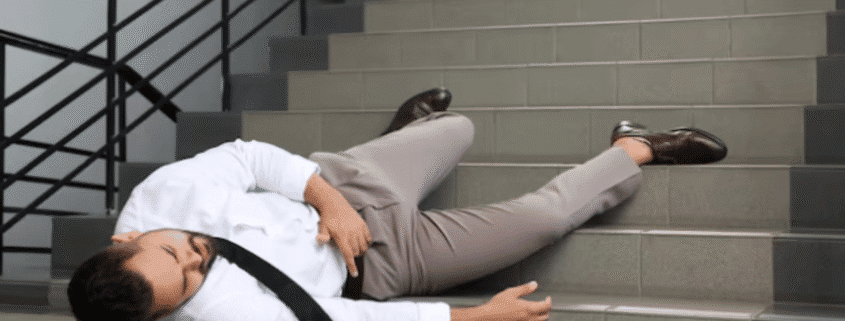What to Do After a Slip and Fall in Utah?
There are many painful consequences of slip-and-fall accidents, including bruises, cuts, sprains, and fractures. This incident can happen in a store aisle, on an icy walkway, or inside a rental. In a very short time, you move from routine errands to pain, worry, and questions about work and medical costs.
This guide explains clear steps to protect your health and your claim. You will learn how to document the scene, how Utah law views fault, and which deadlines can affect your rights. We also cover what to say, what not to say, and how a local lawyer can help level the field with insurance.
The goal is simple. Keep you safe, lower stress, and get you in a much better position to heal both physically and financially. Read now and then file away so you’ll have a checklist if you or someone you love gets injured.
Key Points You Should Know
- Get checked by a doctor within 24 hours
- Report the fall to a manager right away
- Photograph hazards before they are fixed
- Save the shoes and clothes you wore
- Collect witness names and phone numbers
- Do not give recorded statements early
- Track bills, mileage, and missed hours
- Utah has deadlines that can bar claims
- Your fault share can reduce your payout
- Government property has special notice rules
Check Your Health First
Your health comes first. Many injuries from falls are not obvious at the scene. A sore wrist can be a fracture. A mild headache can signal a concussion. Get checked as soon as you can, same day if possible. Medical records from that first visit link the fall to your symptoms. That link is key when an insurer later asks if you were really hurt.
Be clear and complete. Ask for written discharge notes. Follow the treatment plan, including imaging and follow up visits. If new pain appears, return and update your record. Keep copies of bills, visit summaries, and prescriptions. Store them in one folder so you are not hunting for papers later.
Report and Document the Fall Scene
Report the incident to a manager, owner, or supervisor. Do this step immediately. Request an incident report and get a copy.
Note cameras and cleanup
Look for security cameras that may have recorded the spill, leak, or icy spot. Write down where you saw them. If staff clean the area while you are present, write the time you noticed cleanup. Ask the manager to preserve video for the day and time.
Secure video and witnesses
Politely ask to preserve surveillance video and note camera locations. Get witness names and contact info; short confirmation texts help. Save shoes in a bag for evidence, as tread and wear may be relevant.
Utah Rules That Affect Your Rights
Several Utah laws are about slip and fall cases. Knowing the basics helps you plan.
- Filing deadline. In most Utah injury cases, you have four years from the date of harm to file a lawsuit. Missing the deadline can end your claim. See Utah Code § 78B‑2‑307.
- Comparative fault. If you share blame, your recovery drops by your share of fault. If your share is at or above 50%, you cannot recover. See Utah Code § 78B‑5‑818.
- Open and obvious hazards. Utah follows Restatement sections 343 and 343A. A clear danger does not always end a claim, since a landowner may still need to protect against harm they should expect. See Hale v. Beckstead, 2005 UT 24.
- City snow rules. Owners have to must clean sidewalks within 24 hours after a storm. Then make a 42‑inch path that includes curb ramps. This local rule helps show what is reasonable for snow and ice care.
- Government property. If the fall happened on city, county, or state property, strict notice rules apply. A written notice of claim usually must be filed within one year under the Governmental Immunity Act. Missing that step can bar the claim.
Every city has its own local codes, and laws change frequently. Get specific advice for your location.
Talking With Insurance Adjusters the Smart Way
What to say?
Maintain a polite manner and be brief. Share only the basics at first. It includes where and when the fall happened and that you were hurt and are getting care. Confirm your contact information and the claim number. Let them know you will provide documents after you have finished initial treatment.
What to avoid?
Do not guess about speeds, distances, or timing. Do not agree to a recorded statement early. Do not sign blanket medical releases that let an insurer dig through years of records. Do not post about your case online. Early social posts are often taken out of context.
Simple tips that help
- Ask for all requests in writing
- Keep calls short and make notes after each one
- Send documents by email or certified mail
- Save copies in one folder
If the adjuster pushes for a quick settlement before you know the full cost of care, slow down. Settling too soon can leave you paying for later treatment out of pocket.
Common Places Falls Happen in Utah and Why
Grocery stores and big box parking lots
Spills near coolers, entry mats that bunch, and wet floors near produce are common. In winter, water tracks in near doorways. Parking lots collect black ice in shaded spots. Managers should inspect, warn, and fix hazards in a reasonable time.
Sidewalks and public spaces
City rules often require snow and ice removal within a set time. In Salt Lake City, the 24‑hour rule applies and includes curb ramps. If you fall after that window and the area was not treated, that can support a claim, depending on the facts.
Work sites and deliveries
Report right away to a supervisor about cords, uneven surfaces and spills. Workers’ comp may cover medical care and part of lost income if you were on the job. You may also have a third‑party claim if someone else created the hazard.
Mistakes To Avoid After a Fall
Leaving without reporting
If you can stand and it is safe, report the incident before you leave. Ask for an incident report. If you need emergency care first, call later the same day.
Letting proof vanish
Cleaners mop. Snow melts. Video is overwritten. Take photos early. Ask in writing that video be kept. Save your shoes and clothing in bags with the date marked on them.
Guessing or apologizing
Do not fill in blanks with guesses. Do not say “I should have watched my step.” Short, factual statements protect you. Be sure to read the form carefully or ask a lawyer to review it first.
Waiting too long
Claims against government offices often have a one‑year notice requirement. Many private claims have a four‑year filing deadline. Do not let a clock you cannot see harm your case.
When To Call a Utah slip and fall attorney?
Early legal help can stop common mistakes and protect proof. The right lawyer will gather records, secure video, and talk with witnesses while details are fresh. That lawyer will also deal with the property insurer and help you avoid low early offers that do not reflect your true loss.
Chris Cockayne leads a local team at Cockayne Law that focuses on injury cases for Utah families. Clients get clear updates, fast follow through, and a plan that fits the facts. The team coordinates medical records, builds timelines, and prepares strong demand packages that set out the hazard, the duty, the breach, and the harm. They are familiar with Utah rules, including the four‑year filing period for many injury claims, the modified 50% fault rule, and the one‑year notice rule for government property. Those details matter when planning your next step.
There is no single way for every claim. Call for free help understanding what documents you should collect next and protecting your rights while you heal. If you prefer to wait, at least ask a lawyer to preserve video and other time‑sensitive proof for you.
FAQs
What if I was partly at fault for the fall?
Utah uses a modified fault rule. Your payout drops by your share of blame, and if you are at or above 50%, you cannot recover from others.
Does a wet floor sign end my claim?
Not always. A warning helps a business, but it does not excuse unsafe conditions that should be fixed. Each case turns on facts like placement, lighting, and how long the hazard existed.
Can I bring a claim for a fall on a city sidewalk?
Claims on public property have strict rules. Utah Governmental Immunity Act usually requires a written notice of claim within one year, before any lawsuit.
Who pays my medical bills before a settlement?
Your health insurance usually pays first. Keep all bills and explanation of benefits. Later, part of the settlement may reimburse your insurer based on state rules and plan terms.
Should I give the insurer a recorded statement?
Not early on. Share basic facts but avoid a recorded statement until you understand your injuries and have spoken with a lawyer. You can offer a written summary instead.
Why do my shoes matter so much?
Tread, wear, and any residue on the soles can support your case. Save the shoes in a sealed bag with the date marked. Do not wash or throw them away.









